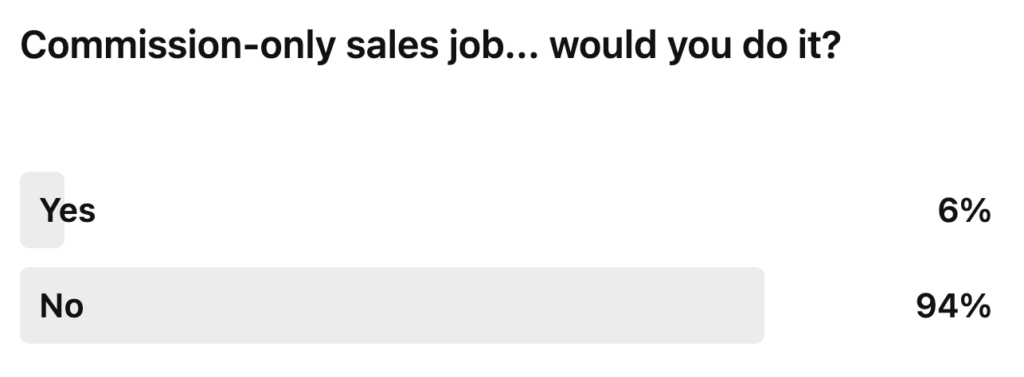Out of the 10 common commission structures we see, the commission-only sales job is one of the most polarizing. (Although, don’t get us started on compensation plans featuring cliffs or floors.)
Those who have excelled in a compensation model that only pays sales reps commissions based on the deals they win will tell you how lucrative it can be.
But with no base salary, the success of commission-only sales jobs depends entirely on pipeline strength. A spotty pipeline will equate to spotty success. And with no base to lean upon, reps can find themselves in precarious financial situations.
I experienced this first-hand in a retail environment selling cell phones as a commission-only sales rep in my early 20s.
Free Sales Commission Calculator Template
A free spreadsheet to simplify the commission tracking process. Track what you or your team have earned in 4 inputs.
Download NowAt the time (the business has now switched to include hourly pay), reps earned between $40-$250 per device based on make and model and contract terms, shared across the floor with other reps. Some days, I’d make close to $1,000 a shift. But on other shifts, I might walk out with $20.
Eventually, I gamed the system a bit to build a schedule at the busiest of stores with the best shifts that I’d try to fill with appointments of my own client base. However, if other reps passed me in the rankings, they had dibs on the shifts and stores.
I found the eps and flows of predictable income challenging after a year and a half and pursued and moved into a salaried-plus commission leadership role.
Now, in my late 30s and with two kids, I can say with certainty that I would not take on a commission-only sales job again.
After running a LinkedIn poll, it seems most people agree.

I wouldn’t do it again because I need to plan for a predictable income with my children. That, and I’m also admittedly not great at sales.
But for those who excel in this field or those who want to learn sales fast, some would say there’s no better way to get good at sales than to make your income entirely dependent on it.
Below, we examine the pros and cons of commission-only sales jobs, what to look for when hiring sales reps on commission-only, plus commission-only comp plans.
Are you interviewing for a commission only sales job?
Here’s what to look for during the interview process:
-
- How do they get leads?
-
- How well-qualified are the leads?
-
- How do they develop the leads?
-
- How much are reps making and what percentage of the team is achieving these results?
-
- What’s the close rate for sales?
Bonus tip: Connect with their top sales reps and ask them about their success and what makes them more successful than others on the team.
Benefits of sales jobs commission only
First and foremost: no commission caps.
Since the company eliminates the financial risk of paying for underperforming reps, very rarely do 100% commission roles come with caps. So, the sky is the limit for the rep. Pair that with high commission rates, and the earnings potential is very high.
Secondly, as mentioned above, 100% commission roles require reps to learn the job fast.
“This type of comp plan works really well if you can stomach some of the risks because you might suck at it for a quarter or two,” said Asher Mathew, Demandbase VP of Go-to-Market Data & Sales Intelligence Cloud. “But it’s the fastest way to learn sales, customer success, and marketing while building your understanding of how to cultivate champions and get a budget allocated to the business initiatives your product supports.”
These roles also typically yield more independence and flexibility to build your own schedule.
Challenges of commission-only sales jobs
Now for the challenges.
My biggest issue in a commission-only job was the volatility of paychecks. I’d have two consecutive quarters absolutely crushing it followed by a month of poor performance. This can cause stress.
Another challenge is high turnover. Since you’re either making money, or you’re not, the revolving door of reps leaving seems to never end.
Plus, banks often flag 100% commission jobs as “high-risk” on house loans or refinancing applications.
Lastly, you are completely in the driver’s seat of your income. If you are not willing to put in the effort to build your pipeline, establish relationships, and close deals, then you will not be successful. This type of role works best for self-motivators who don’t cut corners.
Streamline commissions for your RevOps, Finance, and Sales teams
Design, track, and manage variable incentives with QuotaPath. Give your RevOps, finance, and sales teams transparency into sales compensation.
Talk to SalesHiring sales reps on commission only
In general, we see commission-only sales jobs more commonly in industries where the sale of a product or service is highly variable, like real estate or pharmaceutical sales. For example, the sale of a house or a piece of property can vary greatly depending on the location, the condition of the property, and the market conditions.
In these industries, it is often difficult to predict how much a salesperson will earn in commissions. That’s why so many companies pay a commission-only model.
Plus, “Managing 100% commission-only reps is a beast because the people who will be successful in that sales role are lunatics. You may find a great salesperson, but most salespeople will be a drain on your resources,” said Ali Mirza, CEO & Founder of Rose Garden
However, if you’re looking to hire a salesperson for a commission-only role, here are some of the skills and qualities that successful commission-only reps share in common
- Proactiveness: You’ll need someone always looking for new opportunities to generate leads and close deals. They are not afraid to pick up the phone and cold-call potential customers.
- Persistence: They don’t give up easily. They keep calling on potential customers until they get a yes.
- Communication skills: Reps need to be able to clearly and concisely explain the benefits of their product or service to potential customers. They also need to be able to build rapport with potential customers and answer their questions.
- Negotiation skills: Salespeople who are successful in commission-only roles need to have good negotiation skills. They need to be able to negotiate the terms of a sale and close the deal.
- Self-motivation: Probably the most important quality is self-motivation. They need to be able to set their own goals and work independently to achieve them. They also need to be able to handle rejection and stay motivated even when they don’t make a sale.
- Problem-solving skills: Elite problem-solving skills are imperative. Reps need to be able to identify and solve problems that potential customers may have.
- Knowledge of the product or service: They should have a deep understanding of the product or service they sell.
In addition to these skills and qualities, successful commission-only salespeople are also typically driven, competitive, and have a strong work ethic.
Plus, they manage their time effectively, set realistic goals, and accept the financial risk of commission-only sales jobs.
Commission-only compensation plans
Next, we’ll get into commission-only comp plans, which are generally the easiest to build.
“Due to the simplicity of a commission-only compensation plan, you forgo a lot of risks — when your salespeople succeed, revenue increases; when they fail, you lose nothing,” wrote HubSpot.
When you create 100% commission comp plans, you’ll follow similar steps to your standard comp plan building process with a couple of key differences.
First, if your organization chooses to not offer a base salary, you will want to increase your commission rate substantially.
For instance, the standard commission rate in SaaS is 10%. But SaaS companies most frequently create on-target earnings that consist of a base salary and variable pay, with a 50/50 pay mix.
More SaaS Compensation Trends Data
“The commission rate should be up to 2x that of normal rates,” said QuotaPath Chief of Staff Graham Collins, who has conducted over 500 comp plan consultations.
With that in mind, think 18%-20% on sales.
Secondly, you should avoid decelerators and commission floors. These measures require the rep to achieve a certain amount of sales or revenue before becoming eligible for commissions.
How to build a commission-only comp plan
Step 1: Determine on-target earnings and quota. For most sales roles this will consist of variable pay and a salary. In this case, you will set a target total commissions number and pair that with a quota that is 5x-8x that number.
You could also work top-down by starting with the company-wide annual recurring revenue goal. Then, divide that by the number of salespeople, then again by the average contract value. Divive it a third time by the quarter or months depending on your quota frequency.
Step 2: Set your commission rate. This might fall anywhere between 5% to 45%, according to HubSpot. Keep in mind, the more responsibilities your reps have throughout the customer journey, then the higher the commission rate.
Step 3: Decide when you’ll pay commissions. At the start of service? At the time of contract? For commission-only roles,
Step 4: Define your clawback clauses. If commission-only reps hustle deals in only for them to dissolve shortly after, one way to deter this from happening is to build clawbacks into your commission policy.
Step 5: Factor in onboarding and ramp times of new hires and set up a draw program. This will help offset the delay in commissions as they grow more confident in your sales process.
Step 6: Create a compensation policy that outlines the process and get rep signature to show understanding.
Commission-only compensation plan example
To help you build a commission-only comp plan, we’ve sourced two examples.
The first comes from Asher, who used our free Compensation Hub resource to build out a template according to his business metrics.

His example includes a base rate of 25% and an accelerated rate of 37.%5 that kicks in once the rep archives 100% to quota.
Other variables include:
- OTE: $150,000
- Annual quota: $600,000
- Average contract value: $20,000
- Deals per pay periods: 7.5
You can use a template of his plan to plug in your own business variables.
HubSpot also put together the following plan:

Broken down, that’s a quota of $500,000 for the year with a 20% commission rate applied to every deal, for an OTE of $100,000 take-home for the rep.
That means the rep would aim for $125,000 in revenue per quarter or $41,666 per month.
Conclusion: Sales job commission only, you in?
So, what do you think now? Will you join the 6% of sales reps per our survey willing to accept a sales role? Employers, will you exchange less financial risk for less profit per deal?
If “no” to the latter, you can explore other commission structures that make the most sense for your business.
For additional support in building sales compensation plans, check out our free library of adjustable sales comp plan templates. Once you develop a plan that’s simple, logical, and fair, sign-up for a free 30-day trial in QuotaPath to automate sales compensation management and prepare commission payments.
You can also skip the trial and connect with our sales team. Learn how QuotaPath can run your commission processes more efficiently while motivating and building accountability across your team by scheduling a demo.



